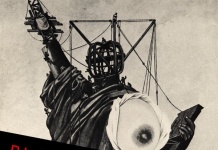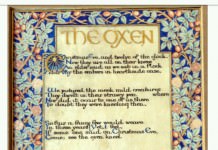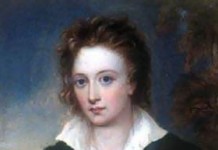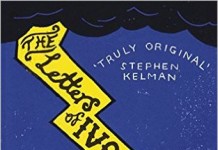 At this year’s Edinburgh International Book Festival, poet Niall Campbell came first in the inaugural Edwin Morgan Poetry Award for young Scottish poets with a first collection (published or unpublished). Under the terms of the Award, he received £20,000 ($33,000), twice the value of the venerable and highly regarded James Tait Black Prize for fiction. I spoke to him about the Award and his own feelings regarding the Scottish tradition.
At this year’s Edinburgh International Book Festival, poet Niall Campbell came first in the inaugural Edwin Morgan Poetry Award for young Scottish poets with a first collection (published or unpublished). Under the terms of the Award, he received £20,000 ($33,000), twice the value of the venerable and highly regarded James Tait Black Prize for fiction. I spoke to him about the Award and his own feelings regarding the Scottish tradition.
TeleRead: What do you see the Award doing for all the finalists and in general for poetry in Scotland?
Niall Campbell: The monetary aspect of the award is, of course, important as it should allow those shortlisted the opportunity to spend more time writing. To invert the old Wall Street saying, Money is Time, Edwin Morgan has afforded us each that bit more time to focus on our writing that we might not otherwise have had. Poetry is never going to be the most financially secure of artistic endeavours, and so any alleviation of this can only help by allowing more time to think, more time to read and write and be inspired by the work of others. Also, you should never discount the energising effect of recognition. It’s not criticism or bad reviews that make starting out in poetry difficult, it is the silence: months, long months can pass without anything of note happening. I know poets who long even for magazine rejections just so they can feel like they are at least there, even if only to be rejected. So, what a spur it is to get something positive like this. And hopefully the profile of the award will bring more people to poetry, both as writers and readers.
TeleRead: What is your view on the place of poetry in Scottish cultural identity? Especially as a poet from a peripheral location?
Niall Campbell: Well, certainly the main symbolic figure for Scottish cultural identity is a poet, Robert Burns. However, despite this, I’m unsure of the centrality of poetry in terms of cultural identity. But then I think that poetry could never be the mainstream art, and I would worry about any culture where poetry achieved such predominance – this is because, for me, poetry is the art-form of doubt – it is our restlessness that creates it, and our restlessness that is fed when we read it. Poetry is an art-form for the unsure, the reflective. An art practice that has included practitioners such as Norman MacCaig, Hugh MacDiarmid, Edwin Muir and Edwin Morgan is never going to be entirely sidelined, but perhaps its place is nearer the edge of things.
TeleRead: What is your personal take on Edwin Morgan and his contribution to Scottish national life?
Niall Campbell: I was about to say that Edwin Morgan is a figurehead for Scottish poetry. But the connotations this have of fixedness and solidity go right against what Morgan was for me. He was an experimenter, a shapeshifter – this same person wrote “The Glasgow Sonnets” and “The Loch Ness Monster’s Song.” He risked change – I cannot think of a more complimentary epitaph for any person.
TeleRead: Do you feel yourself working in a specifically Scottish tradition and if so how?
Niall Campbell: I might be more inclined to position myself in a Celtic tradition, rather than just a purely Scottish one. My favourite poets tend to be those that follow the lyric tradition, and there is plenty to admire on both sides of the Irish Sea. Here I am talking of Seamus Heaney, Michael Longley, Douglas Dunn, Don Paterson, Kathleen Jamie and John Glenday. As for ‘how’ I see myself following in this tradition – the poets I mention are ones whom I admire for the clarity of their thought and music. Their currencies are song and quiet reflection. I see my work as trying to follow these principles.

































